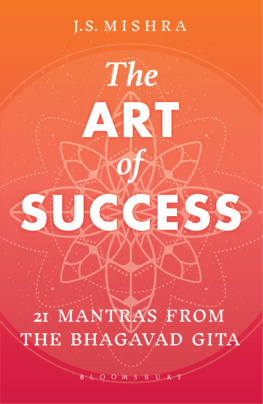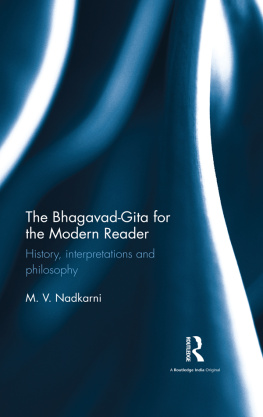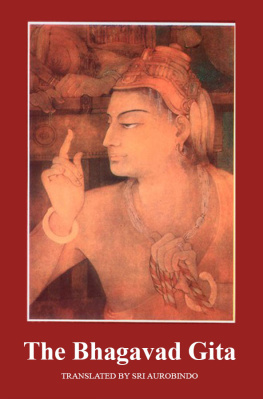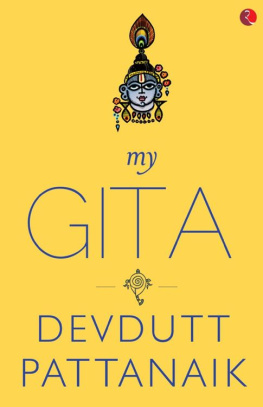Content

The
ART
of
SUCCESS
The
ART
of
SUCCESS
21 MANTRAS FROM
THE BHAGAVAD GITA
J.S. MISHRA

BLOOMSBURY INDIA
Bloomsbury Publishing India Pvt. Ltd
Second Floor, LSC Building No. 4, DDA Complex, Pocket C 6 & 7,
Vasant Kunj New Delhi 110070
BLOOMSBURY, BLOOMSBURY PRIME and the Diana logo are trademarks of Bloomsbury Publishing Plc
First published 2019
Copyright J.S. Mishra, 2019
J.S. Mishra has asserted his rights under the Indian Copyright Act to be identified as Author of this work
All rights reserved. No part of this publication may be reproduced or transmitted in any form or by any means, electronic or mechanical, including photocopying, recording, or any information storage or retrieval system, without prior permission in writing from the publishers
Bloomsbury Publishing Plc does not have any control over, or responsibility for, any third-party websites referred to or in this book. All internet addresses given in this book were correct at the time of going to press. The author and publisher regret any inconvenience caused if addresses have changed or sites have ceased to exist, but can accept no responsibility for any such changes
ISBN: 978-93-89391-28-2
2 4 6 8 10 9 7 5 3 1
Created by Manipal Digital Systems
Bloomsbury Publishing Plc makes every effort to ensure that the papers used in the manufacture of our books are natural, recyclable products made from wood grown in well-managed forests. Our manufacturing processes conform to the environmental regulations of the country of origin.
To find out more about our authors and books visit www.bloomsbury.com and sign up for our newsletters
Dedicated to the sacred memory of my parents,
respected Smt. Rajeshwari Mishra
and
Shri Sabhajeet Mishra
Contents
A ll institutionswhether a family, or a group, a community, an organisation or a countryrequire the presence of a leadersomeone who can take decisions and act righteously on behalf of the institution. Every individualwhether a child, parent, elder or teacherplays the role of a leader at some stage in his life.
Emphasising the role of a leader, Krishna says in the Bhagavad Gita:

Yadyadaacharati shrehhastattadevetaro jana
Sa yatpramaam kurute lokastadanuvartate
(Chapter- 3/21)
(Whatever a great man does, the same is done by others. Whatever standard he sets, the world follows.)
A leader is a visionary who defines reality, and on the basis of which he enables his team to translate its dreams into actuality. This requires creativity in thought, speech and action. The absence of such a personality leads to great suffering for communities, societies and countries. The role of a leader is especially important when an institution faces failures. At such times, a leader ought to deal with situations with equanimity and foresight. History is witness to many such leaders who have taken their nations through tough times with the sheer strength of their character.
While we all want others to change, the irony is that nobody is willing to change themselves, even if it means elevating ones own consciousness. The greatest challenge for a leader, perhaps, is to enable people to assess their own strengths and weaknesses, and help them consolidate those very strengths and eliminate the negative aspects of their personality. For bringing about this change in his people, the leader ought to treat them empathy, integrity and emotional intelligence as well. The Gita argues that one cant become an effective leader unless he understands his own self, is confident of his own strengths, conscious of his potential and comprehends his purpose in life. Therefore, it is imperative that a leader analyses himself thoroughly before attempting to transform the lives of those that he chooses to lead.
Nobody is born a leader. Leadership skills can be developed, and this starts at an early age. The role of the family, educational institutions, life experiences, exposure to education, travel, etc., are all crucial factors for this.
A very important aspect of leadership is teamwork. The leader himself should cast aside his own ego and encourage the team as one unit, thereby sharing the limelight as well as credit with everyone. To be able to bring the team together, it is necessary for the leader to understand that each individual member of his team is unique, with peculiar habits that may have developed as a result of that particular individuals life circumstancestheir family history, geographical location, value systems, education, situations, food habits, work culture and cultural rootsboth as an individual as well as a member of a group or society. In todays world, revolutionary changes in information technology have brought people across the world much closer, and in instant contact with each other. This is the case despite geographical locations, shared aspirations, values, needs, tastes and outlook. Due to social, cultural, economic and educational variations, the attitudes and responses of people to the same situation vary largely from society to society. Thus, a leader has to take into account these factors and formulate suitable policies, strategies and practices specific to his group and the challenges he faces.
The sages and seers of ancient cultures already realised these eternal truths and having arrived at these conclusions, they gave shape to these values, beliefs and ideals in the scripturesthe Vedas, Upanishads, the Ramayana, the Mahabharata and the Gita. The scriptures unfold a vast canvas of society, thereby enabling a leader to derive his lessons in thought, conduct and behaviour of people. The story of Lord Rama as described in the Ramayana, by Maharshi Valmiki, is one such example that has influenced generations regarding values, traditions, appropriate conduct and relationships with family, friends and allies. The great epic Mahabharata, authored by Maharishi Vyas, has strongly impacted the psyche of people in India regarding ethics and morals, beliefs and conduct, and the disastrous consequences of unchecked desires, ego, jealousy, lust, greed and anger. The Gita has been universally studied and pondered over in the context of philosophy and theology, as also a great literary work. Scholars, scientists and leaders including R.W. Emerson, Henry David Thoreau, B.G. Tilak, Mahatma Gandhi, Albert Einstein and Nelson Mandela have all derived inspiration from the Gita. Lessons derived from the Gita remain as relevant today as they were when it was written.
The teachings of the Gita, also known as the Bhagavad Gita, which is a part of the great epic Mahabharata, are of universal significance as far as human values and ideals go, inspiring equally a commoner, a seeker as well as a leader to understand the realities of life, perform actions well and not bother about results. The Gita offers a philosophy, the right perspective, a proper worldview and ways to make life virtuous and meaningful through careful observation and learning with humility. This scripture presents the philosophy of life as a poetic recitation and dialogue between two friends, Krishna and Arjuna, the two most prominent figures that dominate the great canvas of the Mahabharata. The verses of the Gita are a lighthouse of intellect and wisdom, and have great potential for guiding human beings through the turmoil of daily life in todays complex world.















